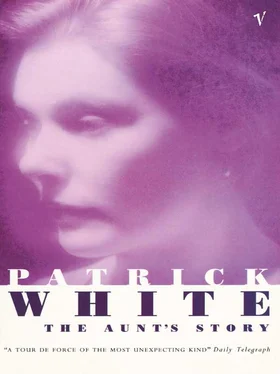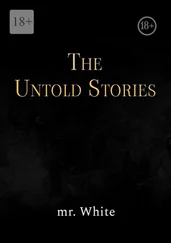‘Oh, Theo, it is lovely to be home, to be free,’ Fanny said.
‘Yes,’ said Theodora, ‘it is lovely.’
And they looked out, the Goodman girls, linked at the window by the moment of discovery, of the bald hills for the first time, and the winding creek. Their cheeks touched as they made this similar voyage. They shivered with their pleasure, and their blood ran together. Fanny is a rose, felt Theodora, but I am a lesser rose on the same stem. And it soothed, it soothed, the flesh of the rose that lay along your cheek.
Actually life at Meroã was not much different when the Goodman girls came home. Father still sat beside the pines, at least in body, or he rode round the place and looked at the fences that had fallen down. And the cows wound into the yard at evening to be milked. And Gertie Stepper punched the dough. Only the sea-green mirror at the end of the passage near the sewing room gave up different shapes, the mysterious elongated forms of young women in long dresses.
‘Now that you girls are home,’ said Mother, ‘there’s a lot that you’ll be able to take off my hands.’
Not that Mother ever had very much on her hands, not that you would notice. She sat on her sofa, like a marble statue wearing silk, and read Hérédia and Leconte de Lisle. To Mrs Goodman everything had a form, like bronze or marble. She saw clearly, but not far. She saw the cattle going down to drink. She saw the sunlight as it lay among the brushes on her dressing table. She heard the passage of her own silk.
The mother of Mrs Goodman had been French, they said, or Austrian, or Portuguese, anyway foreign, which made Mrs Goodman somehow foreign and strange who could speak languages and read them, somebody said even Russian. She was an educated, a clever woman. And pretty when she was young, small and bright. Her hands were small and bright with rings. But hard as a diamond. She had a temper, Julia Goodman. The time she took her riding crop and beat the window in the dining-room because the horses were not brought round, beat the window with the handle of her riding crop, and the glass shivered, and she beat, she beat the jags that were left in the frame. Well, everybody said, this is what George Goodman has taken on.
To those who could not remember, Julia Goodman mostly sat on her sofa and was small and still. She rolled her hands into a tight small ivory ball, studded with diamond or emerald or garnet, just according, but her hands were always hard with rings.
‘… to take off my hands,’ Mrs Goodman said when the girls came home. ‘Now that I am the mother of two young women, I can enjoy the luxury of growing old.’
And her sigh prepared for the softening of age, only it did not come, or not much, apart from a slight slackening of the skin. Watching her girls, Fanny who was pretty and the disappointing Theodora, her eyes were bright inside the bone, they could still shiver glass.
Sometimes Theodora, now that some of the pieces of the puzzle had begun to slide into place, wondered at the unaccountability of human nature, why Father should have married Mother, or Mother Father. They sat in their own rooms, and there was more than the house between; or they met at the round mahogany table, where their words bobbed and sank, bobbed and sank, in the shiny silences. They were the words spoken by two people to describe the business of living together in the same house, in which a chimney sometimes smoked, or a window stuck, and outside, the property, where a cow calved or apples were destroyed by moth. All this continued because it had been begun. It continued because they had stopped seeing what had happened. Acceptance becomes a long sleep. And if Julia Goodman took a knife and turned it in her husband’s side to watch the expression on his face and scent the warm blood that flowed, George Goodman stirred in his sleep and changed position to another dream, of mortgages perhaps, or drought, or fire.
More actual even than the dream of actuality was the perpetual odyssey on which George Goodman was embarked, on which the purple water swelled beneath the keel, rising and falling like the wind of pines on the blue shore of Ithaca. George Goodman sat with his beard spread above the book. The words in his mouth were as smooth and hard and round and tangible and bright as pebbles that the sea has made to glisten. And the names. When Theodora came into the room, into the green, cold soughing of the pines, his eyes, she saw, had not returned.
‘It is cold in here,’ she said, and stooped.
She raked the coals to sparks and threw on another knot of wood.
‘Have you ever thought, Theodora,’ Father said, ‘about Nausicaä, the name? It is as smooth and straight and tough as an arrow.’
She put a rug across his shoulders, because it was cold in the room at that time of year. In the middle of the day the white light would splinter through the pines.
‘An arrow,’ she said, ‘tipped with white. A swan’s feather.’
Because this was something in which they indulged, sometimes casually over the shoulder, to throw to Father the bright, coloured ball. So now she laughed and threw it as she moved towards the door, her brown face, her black hair, glistening under a beaver skin.
‘I am going,’ she laughed, caught still in this last mood, ‘I am going to walk down towards the bridge. Because my feet have died.’
‘There will be another black frost,’ said George Goodman, returning out of the distance.
He said it with an air of surprise, as if it were too sudden, to find himself again in the dream of actuality. His eyes were almost feverish above the grey thicket of his beard. He is old now, she sighed. She has grown, he said, straight as a brown arrow. And as she left, he smiled.
Theodora took down a gun from the rack in the passage. She took down one of Father’s guns, because in time the little rifle had become a polished toy. She let herself out by the side door, under the pines, into the blast of frost, in which her brittle body soon trumpeted its own silver. Consoled by the weight of the gun on her arm, she walked fast on the ringing frost. She walked among the tussocks with the long strides that made them say as Theo Goodman was some bloke in skirts.
How white the skies were at Meroã, wintertime. For years she remembered the winter skies, the pale watered silk. And sound coming from a long way, a calf, or horse’s feet. A horse’s feet, in winter, came up the road and over the bridge as steady as drums.
‘Hey, Theo!’ called the man’s voice.
She stopped to look, through her tears that the frost had made, at a face she could not see.
‘You won’t catch much today,’ called the man. ‘They’re all frozen stiff.’
That, she saw then, as he bent down towards her over the pommel, was Frank Parrott in a full moustache. His eyes were blue and watery with the cold.
‘Oh,’ she said, ‘it’s you.’
‘Yes,’ he said, ‘it’s me. I’ll take you on one day,’ he said. ‘I’ll bring a gun. I’ll put you through your paces.’
‘There was also to be a picnic,’ she said.
He looked at her out of his blank blue eyes. ‘What picnic?’ he asked.
She drew down the corners of her mouth and said that it did not matter.
‘What picnic?’ said Frank.
‘Are you here for long?’ she asked.
‘It all depends.’
But with no indication how. He stared down out of his mystified blue eyes, which reminded her, she laughed, of the eyes of a young bull.
‘Yes,’ said Frank, ‘I shall come down and take you on.’
And his horse danced. A horse always danced under Frank Parrott. Whenever he rode there was a fine piece of bravura, a jingling of metal.
‘I shall wait,’ she called, watching him.
Now, now that she could watch him with calm eyes, she did so with pleasure, but sceptically, the red, arched neck of the young bull that she would have loved to touch, to put her hand on his poll. Frank made her feel experienced, but when he cantered off, her smile dropped. She was not quite sure.
Читать дальше












